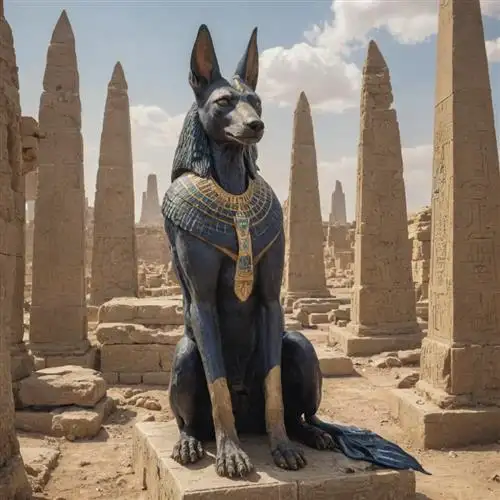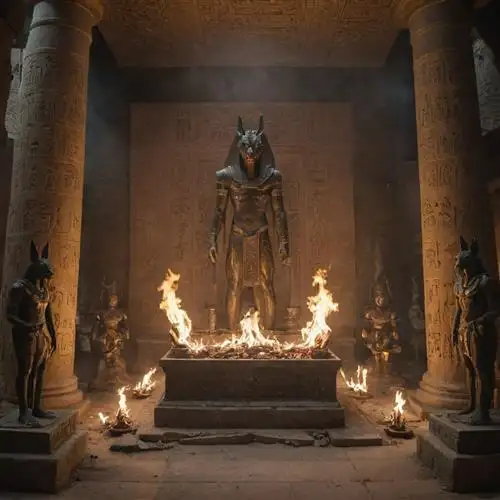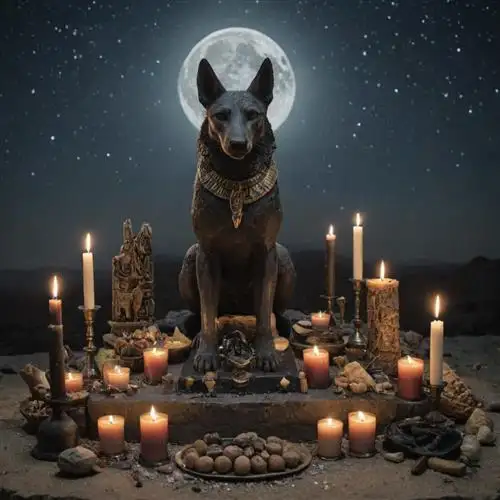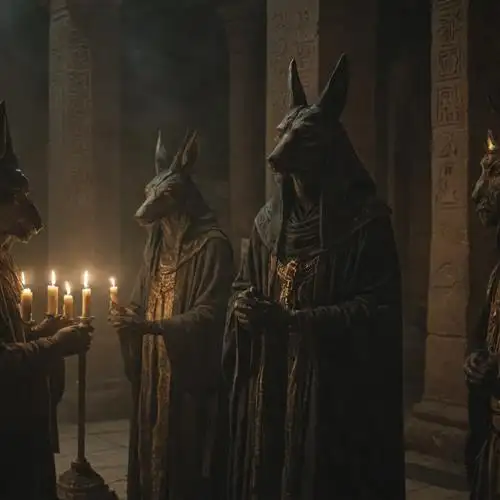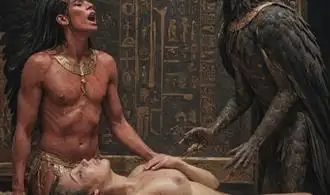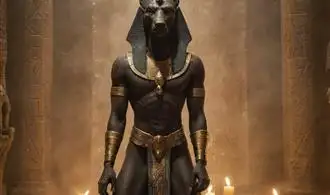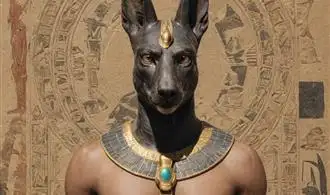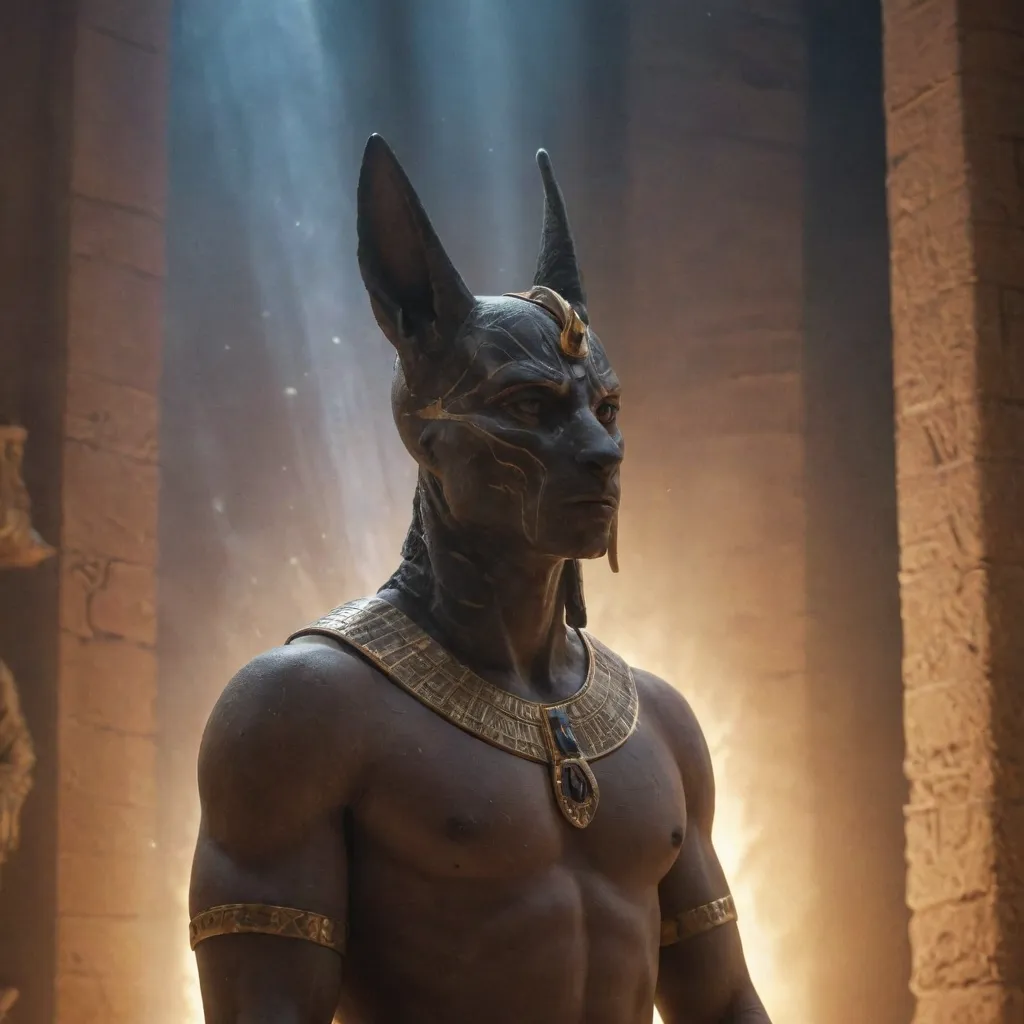
Understanding the Significance of Anubis
Anubis, the jackal-headed Egyptian deity, holds a profound and multifaceted significance in the pantheon of ancient Egyptian mythology. As the god of the dead, embalming, and the afterlife, Anubis played a crucial role in the journey of the deceased through the realm of the hereafter. Understanding the depth and symbolism behind this revered figure is essential for anyone seeking to engage in Anubis-centric rituals.
At the core of Anubis' importance lies his role as the guardian of the dead. He was responsible for guiding the souls of the deceased through the intricate process of mummification, ensuring a smooth transition into the afterlife. Anubis oversaw the weighing of the heart ceremony, a pivotal moment where the deceased's actions in life were judged against the feather of Ma'at, the goddess of truth and justice. This ritual determined the fate of the soul, granting passage to the eternal realm or condemning it to oblivion.
Beyond his function as a psychopomp, Anubis also represented the duality of life and death. As the god of embalming, he symbolized the transformative power of the mummification process, which preserved the physical body while allowing the spirit to transcend the mortal realm. This duality was further reflected in Anubis' association with the liminal spaces between the living and the dead, the seen and the unseen.
Anubis' iconography is also rich in symbolism, with the jackal or dog-like head representing his role as a protector and guide. The black color of his skin is often interpreted as a reference to the fertile soil of the Nile River, which was essential for the cyclical renewal of life. Additionally, the god's connection to the embalming process and the preservation of the physical form aligned him with the regenerative powers of the earth and the cycle of death and rebirth.
Preparing the Ritual Space
Preparing the Ritual Space is a crucial step in performing Anubis rituals for beginners. The energy and atmosphere of the ritual space can significantly impact the effectiveness and authenticity of your practice. Start by choosing a quiet, secluded area where you can work without distractions or interruptions. This could be a dedicated altar space in your home, a serene outdoor location, or a specially designated room.
Cleanse the ritual space by burning sage, incense, or using a ritual broom to sweep away any lingering negative energies. This helps create a sacred and purified environment for your Anubis-focused work. Consider including symbolic objects, such as statues or images of Anubis, to establish a tangible connection with the deity. Arrange these items on your altar or in the designated ritual space, ensuring they are positioned in a way that feels meaningful and balanced.
Lighting is an essential element in Anubis rituals. Use candles, preferably in shades of black, white, or gold, to illuminate the space and set the tone. The flickering flames can help evoke a sense of mystery and reverence. Additionally, you may want to include a bowl of water or a small representation of the Nile River, as Anubis is closely associated with the underworld and the journey of the dead.
Ensure that the ritual space is clean, uncluttered, and free from distractions. This helps you to focus your mind and energy on the task at hand. Consider incorporating elements that appeal to your senses, such as the scent of incense or the soothing sound of a water feature, to enhance the overall atmosphere and connection with Anubis.
Preparing the ritual space with intention and care is essential for establishing a strong foundation for your Anubis-focused rituals. By creating a sacred and inviting environment, you can deepen your connection with the deity and increase the potency of your practice. Remember, the ritual space should feel comfortable and conducive to your personal spiritual journey.
Essential Ritual Items and Offerings
Performing Anubis rituals requires a specific set of ritual items and offerings to properly honor the jackal-headed Egyptian deity. These elements hold deep significance and help create a sacred space for your practice. Let's explore the essential components you'll need to have a meaningful Anubis ritual.
Foremost, an altar or sacred space is crucial. This can be a dedicated table or surface adorned with symbols and items associated with Anubis. Common inclusions are statues or representations of the god, candles, incense, and offerings such as black onyx, ebony, myrrh, and dark-colored flowers or fruits.
Anubis is the god of the dead, mummification, and the underworld. As such, items related to these realms hold great significance. You may wish to incorporate a small bowl of sand or soil, a canopic jar (or representation thereof), and symbols of death and transition, such as a feather or the ankh.
Ritual clothing and adornments can further enhance your connection to Anubis. Black, dark grey, or purple garments are appropriate, as are accessories like jewelry with jackal or canine motifs, or a headdress reminiscent of Anubis' iconic canine features.
Offerings to Anubis are an integral part of the ritual. Traditional offerings include fresh water, milk, wine, bread, dates, figs, and incense. You may also consider leaving small trinkets, personal items, or symbolic objects that hold meaning for you and your practice.
Performing the Anubis Ritual
Anubis, the ancient Egyptian god of the dead, is a powerful entity that can offer guidance, protection, and transformation to those who seek to connect with him. Performing an Anubis ritual is a profound and meaningful experience, one that can deepen your understanding of the afterlife and your own spiritual journey. In this article, we'll explore the key steps to perform an Anubis ritual, ensuring that you can engage with this revered deity in a safe and effective manner.
Before beginning your Anubis ritual, it's essential to create a sacred space. Choose a quiet, clean, and comfortable area, free from distractions. Gather the necessary tools, such as candles, incense, a representation of Anubis (such as a figurine or image), and any other items that hold personal significance. Take a few moments to center yourself, breathing deeply and focusing your intention on connecting with Anubis.
When you're ready, begin by invoking Anubis. You can do this through a recitation of a traditional prayer or by simply addressing the deity directly, expressing your desire to work with him. Anubis is known for his keen sense of justice and his role in guiding the dead to the afterlife, so you may wish to ask for his assistance in matters of integrity, transformation, or the exploration of the unseen realms.
As you continue the ritual, you may choose to engage in various practices that deepen your connection with Anubis. This could include meditation, visualization exercises, or the creation of an Anubis-themed altar. Remember, the specific details of your ritual should be tailored to your personal preferences and needs. The most important aspect is to approach the experience with sincerity, reverence, and a willingness to learn.
Throughout the ritual, be attentive to any signs, messages, or insights that may arise. Anubis is known for his direct and often cryptic communication, so be open to the subtle guidance he may offer. Why Anubis Should Be Your New Spiritual Guide can provide further insights into this intriguing deity and how he can become a powerful ally in your spiritual journey.
Integrating Anubis's Guidance
As you delve into the world of Anubis rituals, it's essential to understand how to integrate the god's guidance into your practice. Anubis, the Egyptian deity associated with embalming, the afterlife, and the protection of the dead, can provide invaluable insights and support during your spiritual journey.
One key aspect of integrating Anubis's guidance is to cultivate a deep connection with the deity. This can be achieved through meditation, visualization exercises, and regular offerings. Spend time contemplating the symbolism and attributes of Anubis, such as his jackal-headed form, his association with the mummification process, and his role as the gatekeeper between the world of the living and the dead.
As you deepen your relationship with Anubis, be mindful of the signs and synchronicities that may arise. Pay attention to your dreams, intuitive insights, and any messages or omens that may manifest. Anubis is known for his ability to guide individuals through the complexities of the afterlife and the transition between life and death, and he may provide you with specific guidance or wisdom during your rituals.
Another important aspect of integrating Anubis's guidance is to incorporate rituals and practices that honor and invoke the deity's presence. This may include the use of Anubis-related symbols, such as the ankh or the jackal, the recitation of prayers or invocations, and the creation of altars or sacred spaces dedicated to the god.
Additionally, consider the symbolic significance of the color black, which is associated with Anubis. Incorporate black candles, crystals, or other black-colored objects into your rituals to deepen the connection with the deity. You may also find it beneficial to work with materials and tools that are connected to the embalming or funerary practices, such as bandages, oils, or incense.

